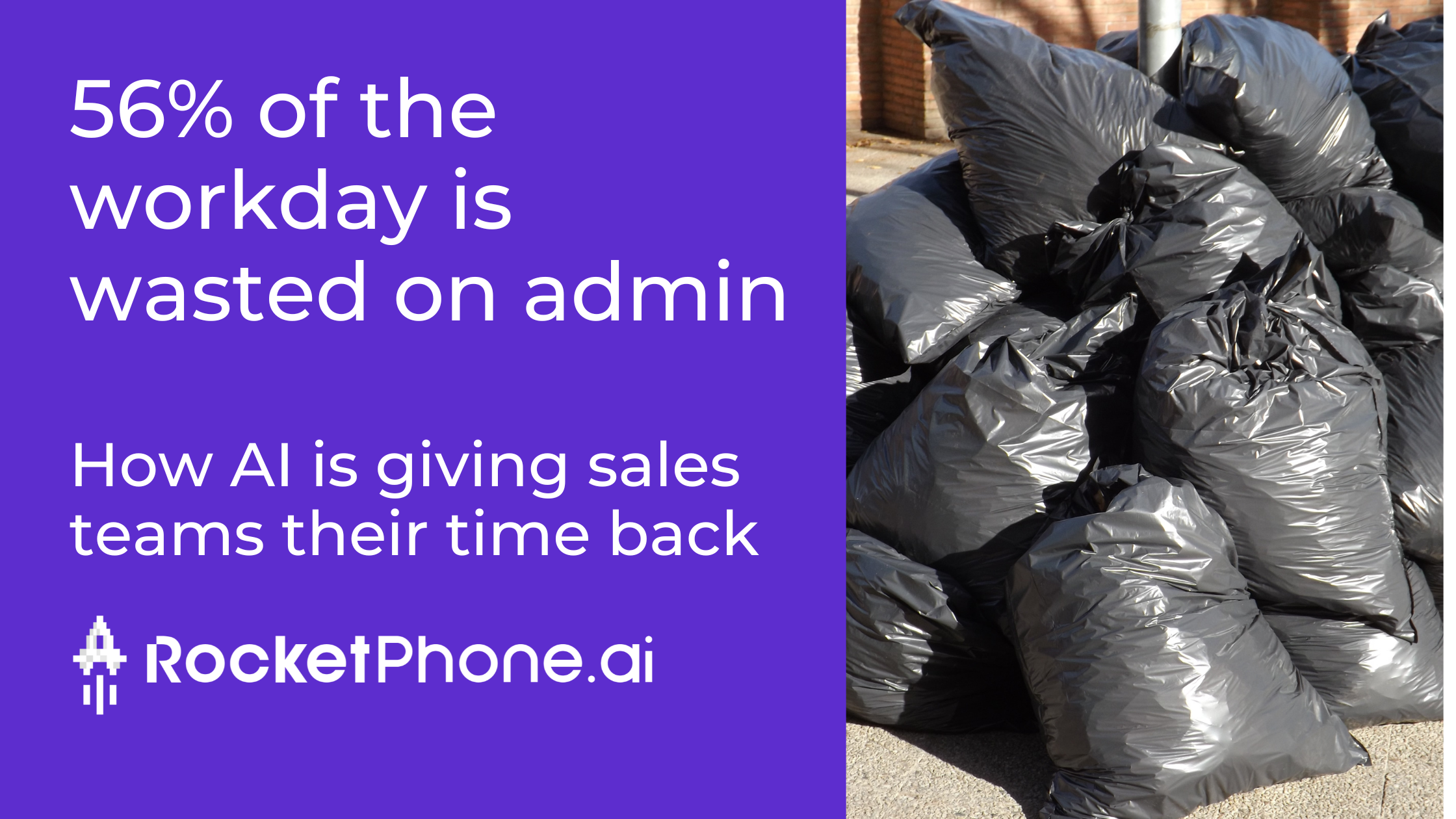
Salesforce Ben Demo Jam Winners 2025! - Watch Announcement

by
July 31, 2025
56% of the workday is wasted on admin. How AI is giving sales teams their time back
Ask any sales leader where their team’s time goes and you’ll likely hear the same answer: not where it should.
According to our recent study, more than half of a sales agent’s day (56%) is spent on administrative work. Not selling, not engaging customers. Admin.
For businesses, that’s not just inefficient; it’s also extremely expensive. In fact, over £14,000 per rep per year is lost to low value tasks. Multiply that across a sales team, and companies are looking at serious dents in productivity, pipeline and revenue.
But the problem isn’t a lack of time. It’s a problem of inefficiency. And with the right tools, it’s one that can be fixed.
The administrative burden
Every sales team knows the pain of admin. Updating CRMs, logging call notes, pulling together follow-ups; necessary, yes, but also relentless. And while these tasks might feel like background noise, their cumulative impact is anything but.
Our research puts a number to it: the average sales rep spends over four hours a day on admin. That translates to a massive amount of worker hours lost to tasks that don’t directly drive revenue. It’s not hard to see how that scales. Across teams, departments and organisations, the cost balloons into a £127 million hole in the UK’s sales potential from missed business opportunities.
But this isn’t just a matter of lost deals. When reps are tied up in admin, they’re not building relationships, following up with leads, or progressing conversations. The very essence of the sales role gets squeezed out by the mechanics of the job.
The ripple effects
When sales teams are stuck in admin, the consequences don’t stay confined to the back office. They quickly ripple outward.
First, there’s the customer experience. With reps distracted by paperwork and process, conversations become rushed, follow-ups get missed, and interactions lose their personal edge. Unsurprisingly, 92% of customers say they’re dissatisfied with the sales experience they receive. That’s not just a service issue. It’s also a revenue risk.
Then there’s the knock-on effect on forecasting. Sales leaders and the C-Suite rely on accurate, timely data to steer strategy. But when that data is delayed, patchy, or inconsistent because it depends on already overstretched reps to input it manually, forecasts become guesswork. The result? Poor visibility, missed targets and strategic blind spots; and for the C-suite, inaccurate forecasting can have serious consequences beyond internal operations as missed forecasts can dent share price and erode investor confidence
And finally, there’s the human cost. When talented salespeople spend most of their day on low-impact admin, it’s demotivating and increasingly stressful. Our research shows sales reps now take an average of four sick days annually due to stress - much higher than the national average of 3.2 days.
Over time, it chips away at engagement, increases burnout and fuels attrition. With 77% of sales reps reporting verbal abuse on calls and limited tools to manage these interactions efficiently, the strain is evident. In a market where experienced sales talent is hard to find and even harder to keep, that’s a problem no business can afford to ignore.
The AI solution
AI steps into its own here. Rather than asking reps to log every call, note every action and chase every next step, AI is doing it for them. Tools like RocketPhone, powered by conversation intelligence, are turning spoken interactions into structured data, capturing what matters and triggering the right follow-ups automatically.
RocketPhone’s AI platform does this natively within Salesforce. It listens in on live customer conversations, capturing not just essential details like names and dates, but valuable insights including competitor mentions, feature requests and customer pain points which are all fed directly into the system of record. No extra steps, no extra admin.
The time savings are obvious. But what’s just as valuable is what AI unlocks: better data, clearer insights and more consistent execution across the sales process. Reps get time back, leaders get visibility and customers get the attention they deserve.
While the benefits are clear, adopting AI in sales isn’t about flipping a switch. It’s about shifting the way teams work. The most effective implementations start with integration, not disruption. AI tools need to slot into the systems teams already use, like Salesforce, without adding complexity. When the technology works quietly in the background, reps are more likely to trust it, and more likely to use it.
Striking the right balance between automation and human connection is key. AI should handle the repetitive and routine so salespeople can double down on strategy, empathy and relationship building. And as AI capabilities evolve, so too will the role of the rep to comprise less of admin, more insight and a far greater impact on the business.
We set out to build the best phone system on the planet and ended up building the best in the universe 🚀
